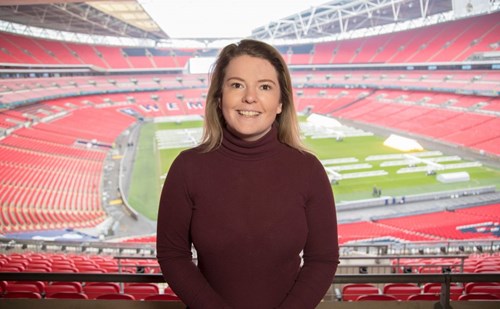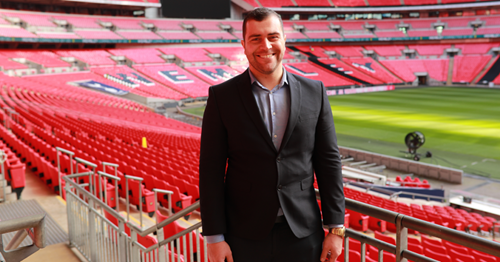The first UEFA Women’s Futsal EURO final tournament kicks off in Porto on Friday with Russia, Spain, Ukraine and hosts Portugal battling it out for the trophy. We spoke with UCFB Regional Recruitment Manager Ellie Lewis, and International Recruitment Officer Pedro Bernardini, about the growth of the sport, the benefits of playing for footballers and the potential career opportunities now available…
Tell us how you got into futsal? How did you start playing?
Pedro Bernardini: My parents are Brazilians and I moved back to Brazil at 13. I always played football but once in Brazil, I could not play for a local football team without graduating from ‘the School of Futsal’. My parents put me in the local futsal club and I played there until I was 17. I have been in love with this game since. Once I moved back to England at 17, I sought to play football but once I became a student at University at 19, I found out there was a futsal club and have been playing and following the sport in England religiously ever since. As a result, I have been playing significantly less 11-a-side.
Ellie Lewis: I have always played sport throughout my life, mostly rugby, however when I was studying at university I lived with a group of girls who played football and futsal. At the weekend I would go and support, which led to me attending training sessions as a goalkeeper for the players “shooting practice”. From there the university formed a Girls Development team that we entered into the BUCS league, increasing my goalkeeping skills and knowledge of the game.
What’s it like playing competitively? What tournaments have you played in?
EL: For me, playing futsal is more exciting than playing football. The game moves quicker and can change in an instant and that thrill and excitement is only enhanced when played competitively.

Ellie won the 2014 FA Futsal Cup with her University of Gloucestershire team
The FA Futsal Cup in 2014 and 2015 have been the highlight tournaments that I have been a part of with the team University of Gloucestershire. The FA Futsal cup is played through regional knockout matches with the top eight male and female teams playing across the weekend at the iconic Copper Box arena. There is no more of a feeling playing your rivals in the final and coming away with a win.
PB: I love it! In England I have played in the BUCS Leagues where I was a National Champion and top goal-scorer for a season (2013 – 2014), and as a result of that played in 2 editions of the European University Futsal Games against some top teams featuring professional and International players. That was an amazing experience.
Domestically, I have played in the Futsal National League (2nd division basically) and I now play in FA Futsal National Super League, which is the top tier of English futsal. Today, I play for Sussex Futsal Club who are 2nd place in the Super League.
For readers who might not be familiar with the sport, what are the main differences with football?
EL: The main difference is that futsal is played inside on a smaller sized pitch with 5 players. The goals are tall and wide, compared to the 5-a-side goals people may be familiar with. The ball is heavier making the play faster and more skilful as you work the ball around the pitch trying to get into the perfect position to shoot. Unlike football, futsal do not have “throw ins”, the ball is kicked in and the player has 4 seconds to kick in the ball back into play. Futsal consists of 20 minute halves and can be very high tempo which allows for substitutions are to be “roll on roll off”.
PB: Futsal is a 5-a-side variation of football played in an indoor sports hall usually in a 40m by 20m space. The goals are the same size as handball goals (2 x 3m) and the ball is smaller and heavier (size 4) than in 11-a-side. It is a very intense and dynamic game which I would recommend to everyone that has an interest in football to try out for your local team to experience it. If you join the right club with a good balance of performance and social settings, you will fall in love with it and never look back.
Futsal has been used by football clubs in recent years to develop the skills of their players. What are the benefits of playing futsal if you’re a footballer?
PB: Playing in a smaller space, you are constantly under pressure which means you have less time to think and react than you would in football. Also, as the ball is smaller and heavier, it is harder to control and usually, you use many more parts of the foot to control, pass and shoot than in football. For example, we use a lot of the sole to control the ball and the toe to shoot, which is uncommon in football. Really, you must be a complete player to excel in futsal (attack, defend, dribble, shoot, use both feet, etc).
Some top football players that had a lot of exposure to futsal as children and attribute futsal as a big factor in their development include Neymar, Cristiano Ronaldo, Messi, Sergio Busquets, Sergio Aguero and David De Gea, to name a few of an extensive list.
EL: Fitness is a big improvement (as you are constantly moving around the pitch following the ball), along with becoming more agile on and off the ball. Footwork is also a big improvement for players.
Participation rates in futsal are growing rapidly – what do you attribute this to?
PB: More awareness of the sport. In the UK, there are futsal specific coaching badges and football coaches are being encouraged to learn more about futsal and complete their badges in futsal. Also, there are more leagues, more teams registered to competitions and affiliated to the FA, more youth leagues, more coaching companies doing futsal, and etc than ever before. Universities too have adopted futsal and as a result, all of these factors contribute to more awareness of the sport and elevated numbers of participation.
EL: I’m a big supporter of females in sport and the importance of showcasing women to the same level as men in sport. Through the support of the FA, National Leagues and universities, women futsal has continued to grow and be recognised alongside men’s futsal. The FA Futsal Cup is an example of men and women playing sport at a high level in the same equal environment.
What opportunities are there to work in the sport?
PB: Domestically, following the new futsal Strategy implemented by the FA as of 2018, regional FA’s have been tasked with futsal related KPI’s. This means the provision of futsal must be monitored at a regional level. This is the first time this has happened in England.
This also means that there is or will be a demand for people with a particular skill-set that understand sports development and futsal. The expectation is for futsal to become more popular, increase the trend of improved participation rates and as a result, increase KPI’s and the demand for qualified futsal professionals.

Pedro was sub-contracted by the FA National Futsal League committee and worked on their media and promotion activities
In addition to this, other opportunities in the business side of the sport may appear. Just last year, I was sub-contracted by the FA National Futsal League committee, who outsourced to me a portion of their media and promotion activities. I made a living of this solely for a year.
In addition to this, my team-mate Doug Reed who is an England International, created Futsal Insights, with Simon Wright, owner of Manchester Futsal Club who are in the Super League. Futsal Insights is the first futsal conference in the world dedicated to the development of the sport and has been attracting many international keynote speakers and a global audience, showing that there is potential for investment in the sport and a growing interest. Their next event will be taking place on 2nd March.
All of this is evidence that there are opportunities in the sport, and space for innovation. As the sport grows, more people will be needed to be in charge of leadership and mid-level roles within the sport.
As well as hosting this weekend’s UEFA Women’s Futsal EURO finals, Portugal also hosted the UEFA Futsal Cup in 2002 and the UEFA Futsal EURO 2007. What makes Portugal such a hub for the sport?
EL: Futsal being one of the most popular sports in Portugal, it is embedded within their grassroots structure of football. And the success and world ranking of the men’s team is a great platform to showcase the women’s game.
PB: Portugal recently won the Men’s version of the Euro’s and have the best player in the world in futsal, Ricardinho. A lot of their football players, such as Cristiano Ronaldo, grew up playing futsal. It is part of Portuguese culture and many know what it is, unlike in England. This can be attributed to the fact that there are many schools which have sports halls that are used for futsal and there is an initiative from the governing body for futsal to be practised alongside football for technical development reasons.
Though I can’t say I am aware of their governing bodies development initiatives from 20 years ago, what I do know is that from 2016 to now, there has been an increase of 3.1% of participation in futsal for men and a 4.6% increase for women with more than 31,000 people officially registered as futsal players as pro’s, semi-pros and amateurs. These are quite big increases in a country that already played the sport!
Furthermore, with the top futsal league in Portugal containing some professional football clubs such as Benfica and Sporting Lisbon, there is a growing audience and some of these matches get prime air time on TV due to the brand of the clubs involved. It guarantees viewers. This in turn contributes to an increase in participation rates, a popularisation and more ‘consumption’ in the sport.
















